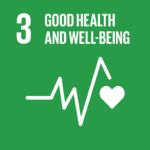The healthcare sector is responsible for up to 5 percent of global carbon emissions—surpassing even the aviation and shipping industries—and its impact is expected to triple by 2050 if left unchecked.
As the global healthcare industry grapples with its significant environmental footprint, managing waste and emissions remains a daunting challenge, especially in Asia. The healthcare sector is responsible for up to 5 percent of global carbon emissions—surpassing even the aviation and shipping industries—and its impact is expected to triple by 2050 if left unchecked. With Asia’s rapidly aging population and escalating climate risks, the need for sustainable healthcare practices has never been more urgent.
RELEVANT SUSTAINABLE GOALS



The Hidden Environmental Cost of Healthcare
Healthcare is often associated with visits to clinics and hospitals, treatments, and the promise of recovery. However, behind every patient interaction lies a substantial environmental cost. The sector relies heavily on energy for medical equipment, heating, cooling, and lighting, but the primary culprit of emissions is Scope 3—those emissions that originate from the supply chain. This includes everything from the production of medical supplies and pharmaceuticals to the transportation required for delivering goods and services, and the travel of healthcare professionals and patients.
In Asia, the healthcare sector accounts for approximately 30 percent of the region’s carbon emissions. This is starkly higher compared to the sector’s contribution of around 8.5 percent in the United States and roughly 5 percent in Europe. Several factors contribute to this disparity, including Asia’s aging population—projected to represent two-thirds of the world’s population over the age of 65 by 2030—and growing healthcare demand fueled by economic growth.
The COVID-19 pandemic has further exacerbated the problem, leading to unprecedented quantities of medical waste, including disposable protective gear and single-use medical supplies. Compounding these issues is the lack of proper waste management infrastructure across the region, making it difficult to handle the growing mountains of healthcare refuse.
Climate Change and Healthcare: A Vicious Cycle
Asia’s healthcare challenges are further complicated by the region’s vulnerability to climate-related health risks. Rising temperatures and increasing frequency of extreme weather events have led to a surge in heat-related illnesses and other health conditions, driving more people to seek medical care. This, in turn, generates more waste and emissions, creating a vicious cycle that is unsustainable in the long term.
“The escalating impact of climate change has had an undeniable impact on the health of societies,” said John Graham, CEO of Zuellig Pharma, a healthcare solutions provider. “Extreme weather events, air pollution, and increased incidence of vector-borne diseases are all evidence of this.”
One significant hurdle in reducing healthcare emissions lies in the need to maintain the efficacy of temperature-sensitive vaccines and medications during transportation. “Ensuring the integrity of these products is paramount,” Graham noted, highlighting the sector’s reliance on energy-intensive equipment such as MRI and CT scanners, and the heating, ventilation, and air conditioning systems essential for maintaining sterile environments.
The Push for National Policies
While initiatives like the United Nations-backed Race to Zero campaign and the Global Road Map for Health Care Decarbonisation provide frameworks for reducing healthcare emissions, these efforts are largely voluntary. Currently, there are no legally binding laws in Asia mandating emissions or waste reductions in the healthcare sector.
In the absence of stringent regulations, some healthcare companies are taking the initiative to reduce their environmental impact. Zuellig Pharma, for example, has integrated greenhouse gas emissions tracking and monitoring into its operations and prioritizes partnerships with suppliers committed to sustainability. The company has also introduced electric vehicles to its fleet and developed technologies to reduce energy use in refrigerated trucks.
Zuellig Pharma’s efforts extend to waste management as well. In partnership with the Business Council for Sustainable Development Malaysia and Baxter Healthcare, the company launched the “Jom Recycle – Plastic Recycling in Homecare” initiative, which recycles non-contaminated renal dialysis bags into secondary raw materials. This program has diverted over 500 kilograms of high-grade plastic waste from landfills in Malaysia.
Striking a Delicate Balance
With patient health as the primary focus, Asia’s healthcare sector must find a balance between urgent decarbonization efforts and the demand for medical care. Simple steps, such as adopting telemedicine, can reduce Scope 3 emissions by cutting down on patient travel and the associated waste from single-use medical supplies. A 2021 study found that every virtual medical consultation could reduce between 0.70 and 372 kilograms of carbon dioxide equivalent.
However, until national regulations mandate emissions reductions, healthcare providers will need to continue exploring ways to innovate and integrate sustainability into their operations. “The industry needs to work together to invest in solutions that reflect modern priorities,” Graham said. “We must continuously improve the accessibility of quality healthcare without compromising the societies we operate in and the planet that we inhabit.”
Lead image courtesy of Victoria Baker from Getty Images
You may also be interested in :
Climate Change Can Lead To More Zoonotic and Waterborne Diseases : DRIIV Conference





This Post Has 3 Comments
What i do not realize is in fact how you are no longer actually much more wellfavored than you might be right now Youre very intelligent You recognize thus considerably in relation to this topic made me in my view believe it from numerous numerous angles Its like men and women are not fascinated until it is one thing to do with Lady gaga Your own stuffs excellent All the time handle it up
you are in reality a just right webmaster The site loading velocity is incredible It seems that you are doing any unique trick In addition The contents are masterwork you have performed a wonderful task on this topic
Wonderful web site Lots of useful info here Im sending it to a few friends ans additionally sharing in delicious And obviously thanks to your effort
Comments are closed.